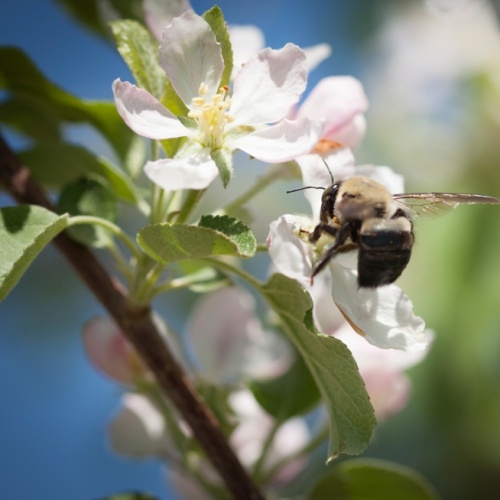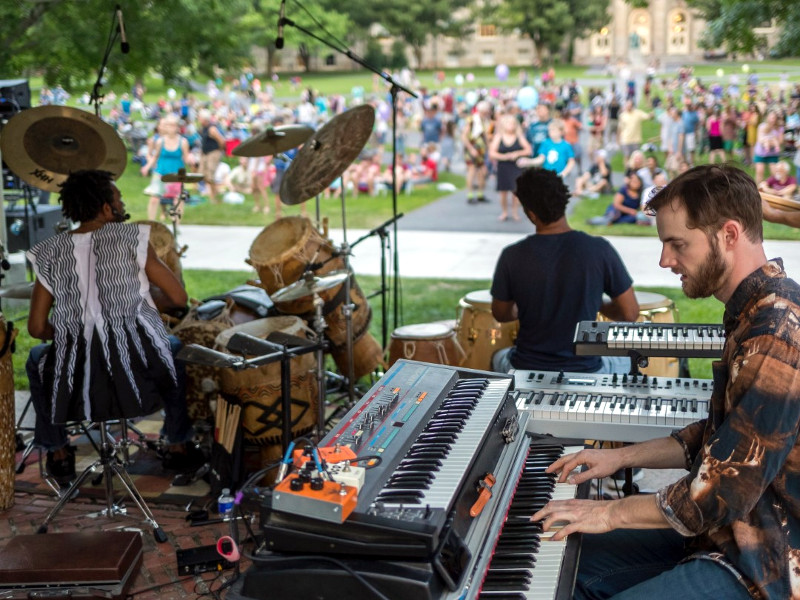News & Events
Summer Session course spotlight: Honey Bees: Their Intriguing Biology and Interactions with Humans

Cornell SCE, May 1, 2023
For the first time, Honey Bees: Their Intriguing Biology and Interactions with Humans (ENTOM 2030) will be offered during Summer Session 2023.
This online course, taught by Dr. Marina Caillaud, a lecturer in the Department of Entomology, will examine the lives of bees, their contribution to humanity through the ages, as well as the threats they are currently facing.
"Honey bees have been an object of fascination for mankind since prehistoric times," said Dr. Caillaud. "Along with many wild bees, they are essential coworkers in agriculture and they are increasingly important partners for sustainable agriculture that limits the use of pesticides."
Students will explore topics including chemical ecology, insect physiology, beekeeping, behavioral ecology, pollination biology, sociobiology and conservation biology.
The three-credit course, run by Cornell's School of Continuing Education and Summer Sessions (SCE) from June 20 to July 28, is open to all students, including those in high school.
Dr. Caillaud spoke to SCE about what students can expect from the course.
What do you hope your students come away with by the end of the course?
Besides coming away with college credits, I hope that students will gain an increased understanding, respect, and appreciation for forms of life most people ignore or fear—bees. Equally important to me is to raise their ability to question myths and misconceptions about bees and critically evaluate the information they find online on controversial topics such as pesticides or apitherapy.
For students who are still in high school, I also hope that this course contributes to their college readiness by introducing them to college-level expectations and academic standards.
This is your first Summer Session course on bee biology. What inspired you to offer it?
I offered a similar course during Fall 2020 to Cornell University undergraduates when that semester was fully remote due to the Covid-19 pandemic. To my surprise, I discovered that it was possible to offer a high-quality education fully online. I also realized that the online/asynchronous model was increasing accessibility by removing the barriers of geographical location, schedule (if the course is taught asynchronously) and language thanks to the translation tools made available. It is also a model that works well for many students with disabilities. This motivated me to look for further opportunities to offer an online version of the bee biology course.
What is the ideal student for this course?
I expect most enrolled students to be college undergraduates who need or want to earn credits in the summer, or high school students who are ready for more challenging courses in biological sciences. In either case, these students would have to be self-motivated and independent because online classes require a higher level of self-discipline and motivation than in-person classes. They will need to be able to manage their time effectively and to have good organizational skills to complete all coursework and assignments.
What are the things that you think you’ll enjoy about teaching about this?
I am looking forward to the challenge of creating high-quality and engaging educational material for a fully online/asynchronous class. Designing assessments in the age of ChatGPT will be particularly interesting. As in any course I teach, I am also looking forward to meeting individuals from diverse backgrounds who will enrich the collective learning by sharing their perspective and personal experience. Reading or hearing students’ reflections on the material covered in class is never boring.
Beyond this course, Summer Session offers hundreds of regular Cornell courses on campus, online and around the world. Enrollment is open to all—from undergrads to high school students, professionals, alumni, and any interested adult. Students can choose from three-, six- or eight-week sessions and earn up to 15 credits
To learn more about online courses offered to high school students, visit Precollege Studies. To learn more about Summer Session, which is open to undergraduates, visiting students and any interested adult, visit the SCE website.



